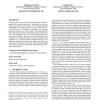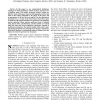5 search results - page 1 / 1 » A rational model of preference learning and choice predictio... |
NIPS
2008
13 years 5 months ago
2008
Young children demonstrate the ability to make inferences about the preferences of other agents based on their choices. However, there exists no overarching account of what childr...
ACII
2007
Springer
13 years 10 months ago
2007
Springer
An investigation into capturing the relation of physiology, beyond heart rate recording, to expressed preferences of entertainment in children’s physical gameplay is presented in...
ATAL
2005
Springer
13 years 10 months ago
2005
Springer
We study agent societies where self-interested agents interact repeatedly over extended time periods. In particular, we are interested in environments where agents can form mutual...
CORR
2011
Springer
12 years 11 months ago
2011
Springer
Modeling the behavior of imperfect agents from a small number of observations is a difficult, but important task. In the singleagent decision-theoretic setting, inverse optimal co...
TCIAIG
2010
12 years 11 months ago
2010
In this paper, we use computational intelligence techniques to built quantitative models of player experience for a platform game. The models accurately predict certain key affecti...


